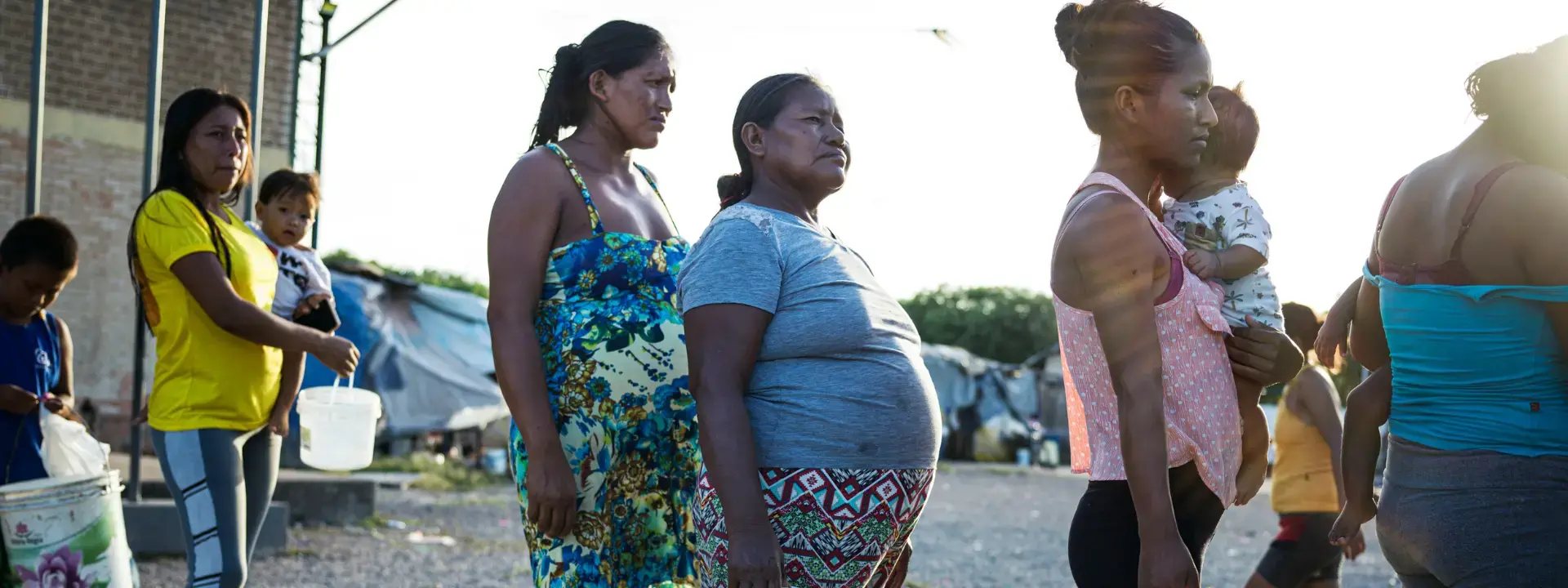Safeguarding lives and dignity in times of crisis
When an emergency strikes, life can change in an instant. Conflicts, violence, or natural disasters can destroy homes and endanger thousands of lives, forcing people to flee in search of safer places. In a matter of minutes, a human being can find themselves deprived of their most basic needs in life, such as shelter, water, food, clothing, basic hygiene supplies, or medicine.
During these situations, access to health services becomes difficult, as they are damaged, destroyed, or become inaccessible; maternal deaths and sexual violence increase, and reproductive health services, including pregnancy and childbirth care, become scarce.
Currently, over 51 million people worldwide are forcibly displaced due to persecution, conflict, generalized violence, or human rights violations. Nearly half of these individuals are women and girls.
Approximately 80% of the population in Latin America and the Caribbean lives in urban and peri-urban areas, and at least 75% of the population lives in high-risk zones. Disasters increase social vulnerability and exacerbate existing inequalities, even more so in contexts of poverty and exclusion.
Our Challenge
In times of humanitarian crisis, the United Nations Population Fund (UNFPA) plays a crucial role in rapidly and effectively implementing measures to safeguard the lives of affected individuals, focusing attention on the most vulnerable groups, primarily women and adolescent girls.
The countries of Latin America and the Caribbean face significant challenges during humanitarian crises. In this context, it's essential to develop collaborative strategies that allow for better preparedness and response for adequate and timely assistance that incorporates the basic needs of women, youth, and adolescents.
Our Response in Times of Crisis
UNFPA is part of the group of United Nations agencies that, upon the declaration of an emergency, spring into action, forming a humanitarian response network whose objective is to work hand-in-hand to bring assistance to those in the most vulnerable conditions. UNFPA is part of the Inter-Agency Standing Committee (IASC) and works within the Transformative Agenda. UNFPA's humanitarian response to emergency situations in Latin America and the Caribbean consists of:
Minimum Sexual and Reproductive Health Services
In the face of disaster, women continue to become pregnant and give birth. During emergencies, UNFPA helps improve all aspects related to maternal health, protect women, girls, and adolescents against sexual violence, and prevent sexually transmitted infections, including HIV.
Providing Responses to Basic Needs in Emergency Contexts
Supporting countries in the region to strengthen capacities and mechanisms to ensure safety and health, especially for women, adolescents, and youth; similarly, UNFPA delivers culturally sensitive kits, designed in conjunction with affected communities, primarily women, to safeguard and protect their dignity and cover their basic needs after an emergency.
Working with Youth and Adolescents
Young people are also affected by emergencies in a differentiated way. The lack of protection and family and community support makes youth more vulnerable to violence, sexual abuse, and exploitation, as well as sexually transmitted infections and HIV. UNFPA collaborates to address the specific needs of young people in crisis and establishes partnerships to involve them in emergency response.
UNFPA, in conjunction with other United Nations system organizations, governmental institutions, and NGOs, develops programs, plans, and procedures to ensure humanitarian preparedness and assistance to guarantee sexual and reproductive health, protection against gender-based violence and sexual violence, and the capacity to manage socio-demographic data in emergencies.
Other Resources
To expand the reach of the United Nations Population Fund's humanitarian response strategy, we provide a series of documents and supporting materials relevant to the Latin America and Caribbean region.
- SRH in Emergencies PIMS - Calculator
- Managing Gender-Based Violence Programs in Emergencies
- Gender-Based Violence and Natural Disasters in Latin America and the Caribbean Tri-fold
- Training on Sexual and Reproductive Health in Humanitarian Settings
- Guidelines for the Collection and Analysis of Socio-demographic Data in Humanitarian Crisis Situations in Latin America and the Caribbean
- Handbook for the Use of the Guidelines for the Collection and Analysis of Socio-demographic Data for Use in Humanitarian Crisis Situations in Latin America and the Caribbean
- Operational Tools for the Collection and Analysis of Socio-demographic Data in Humanitarian Crisis Situations in Latin America and the Caribbean
- Learn to Respond


